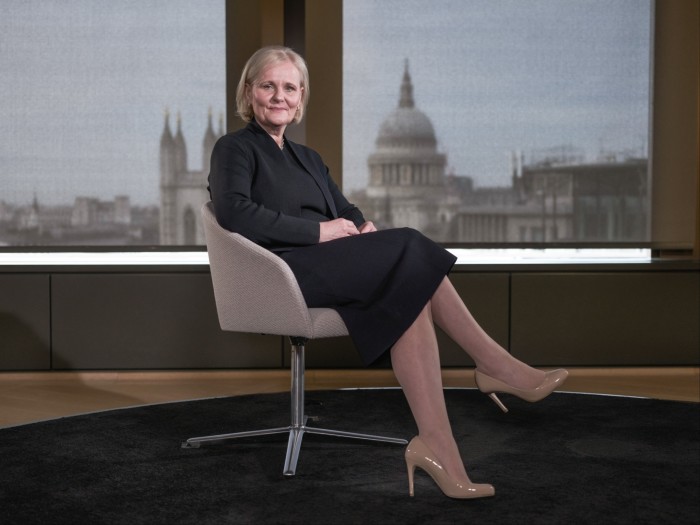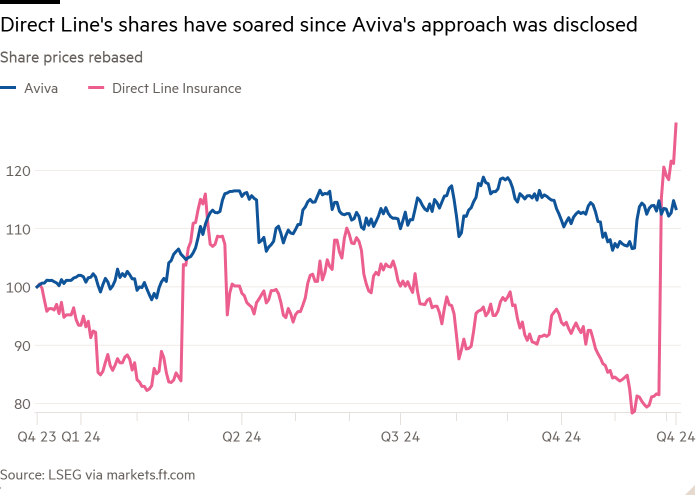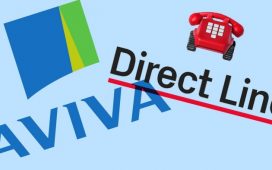Aviva and Direct Line began this week as two rival UK insurers. They end it as prospective marriage partners.
After three offers from Aviva, the first of which was only made public last week, Direct Line’s board agreed late on Thursday to a £3.6bn takeover with its larger rival.
If the offer is approved by shareholders, the acquisition will create a £16bn insurance company that will dominate the motor and home markets in the UK, with shares of more than 20 per cent and 15 per cent, respectively.
The takeover is a coup for Aviva, led by chief executive Dame Amanda Blanc. She declared at the start of her tenure in 2020 that she would move quickly to achieve her strategic objectives for the FTSE 100 group; she managed to divest eight non-core businesses within the space of a year and a half.
The approach for Direct Line was quicker still.
“This whole process was eight days from start to finish, it was very speedy — that’s classic Amanda,” said one person close to the Direct Line deal. “She’s sold eight businesses in 18 months; she doesn’t mess around.”
The proposed transaction marks the end of independence for Direct Line, the insurer formed in 1985 and later carved out of Royal Bank of Scotland in 2012 in the wake of the financial crisis.
Its surrender to Aviva raises questions over the future of Adam Winslow, the former Aviva executive who took the helm of Direct Line in March this year following the departure of Penny James. She stepped down in 2023 following a tumultuous two years for the business in which it suffered profit warnings and temporarily dropped its dividend.
Seen as vulnerable to a takeover, earlier this year it fended off two approaches from Ageas, the Belgian insurer.
It was in the wake of this failed approach that the seeds of Aviva’s plan were first sown, according to people close to the deal. Aviva had begun to take a serious look at Direct Line over the summer months, building up to a non-binding proposal of 250p per share on November 19.
This came as a surprise to the Direct Line board, according to people close to the bid.
Aviva had also previously been exploring a possible deal for the UK insurance company esure owned by the private equity group Bain Capital. But its interest had cooled in recent weeks as it focused in on Direct Line, according to people familiar with the matter.
Blanc was looking for acquisitions to help pivot the £13bn business, which has a large life insurance book, towards more capital-light areas: Direct Line fitted the bill. Though struggling in some areas, Direct Line had several well-known brands, such as Churchill and Privilege. Aviva believed there were “material” synergy and capital savings in a tie-up of the groups.
Meanwhile, Winslow was in the early stages of a turnaround of Direct Line, which was battling a challenging motor insurance market. He had started to assemble a new team and set out a £100mn cost savings plan, but the UK group’s depressed share price made it vulnerable.
Aviva first offered 250p a share in mid-November, in a move that valued Direct Line at around £3.3bn. By November 26, Direct Line’s board, led by Danuta Gray, rejected the approach as “substantially” undervaluing the business, and refused to engage. A statement was made to the market the next day.

But Gray met with her counterpart at Aviva, George Culmer, to explain the reasons why the bid was turned down, according to two people familiar with the situation.
Negotiations were then largely handled through the two companies’ chairs, with some involvement from advisers, as Aviva upped its offer to 261p per share this Tuesday.
On Wednesday, Direct Line’s board convened for an urgent meeting. By Thursday, Bloomberg News published a news report on the improved offer. The board had not yet responded to the latest proposal and the leak forced an accelerated timeline. The two sides reached agreement late on Thursday at 275p per share.
Direct Line’s shares closed up 6.5 per cent at 251p in London trading on Friday; earlier this week they had been languishing at around 230p.

But the speed at which Direct Line rolled over has raised eyebrows, even among those close to the deal.
“Why did we need to go through this public bid dance? Everything pointed to the 275p,” said one person familiar with the deal. “This is how the market works these days. People just want to look as though they are getting their pound of flesh”.
Direct Line worked with its bankers at Morgan Stanley, UK boutique bank Robey Warshaw and RBC, while Aviva was advised by Citigroup and Goldman Sachs.
Another unusual element of the deal was that Goldman had advised Direct Line on its defence from Ageas earlier this year. A bank spokesman said that the firm “mutually agreed to end our engagement with Direct Line in the summer”. This then allowed it to advise Aviva, for whom it also has a corporate broking role.
The deal has been welcomed by top investors in Direct Line, who lobbied for the board to hold tight for a better deal than the original 250p per share.
“Given the share component, the price of 275p looks acceptable — it probably would have been a different answer if it had been an all-cash offer,” said one top shareholder in both Aviva and Direct Line.
“Being willing to accept the offer is no reflection on the DLG management; it’s a consequence of the tough backdrop, the mountain that DLG has to climb, the positive view of the Aviva management, and what the combination of the two firms could be worth.”
Another Direct Line shareholder, who is also a top investor in Aviva, said he thought at first Aviva might “hold their nerve” but then was concerned that Direct Line would not engage.
He added that the second offer of 261p was “not enough” when it emerged late on Thursday.
The latest offer of 275p gave “enough there to see value from Aviva’s view and for Direct Line to accept”.
The deal is yet to be consummated by the Direct Line shareholders — who could still push for more — and is subject to Aviva’s due diligence. Aviva has until December 25 to make its approach formal.
Even then, there could be other competition hurdles to overcome for a combined group that will command more than a fifth of the motor insurance market. Both the Competition and Markets Authority and the Bank of England’s Prudential Regulation Authority are expected to scrutinise the deal.
There is also a sensitive issue around how the newly enlarged team will blend, given reports of a tense relationship between Winslow and Blanc, his former boss. “Their working relationship is professional,” said one person close to Aviva.
Still, the deal should deliver Winslow £1.1mn in cash and £1.2mn worth of Aviva shares, or a total of £2.3mn, based on his share options as of April 5, according to MKP Advisors.
Direct Line and Aviva both declined to comment.
“Aviva has performed every step of the takeover dance flawlessly,” said Dan Coatsworth of AJ Bell.
With a Christmas deadline, dealmakers on the takeover can only hope that Aviva can wrap up the deal as quickly as it began.











